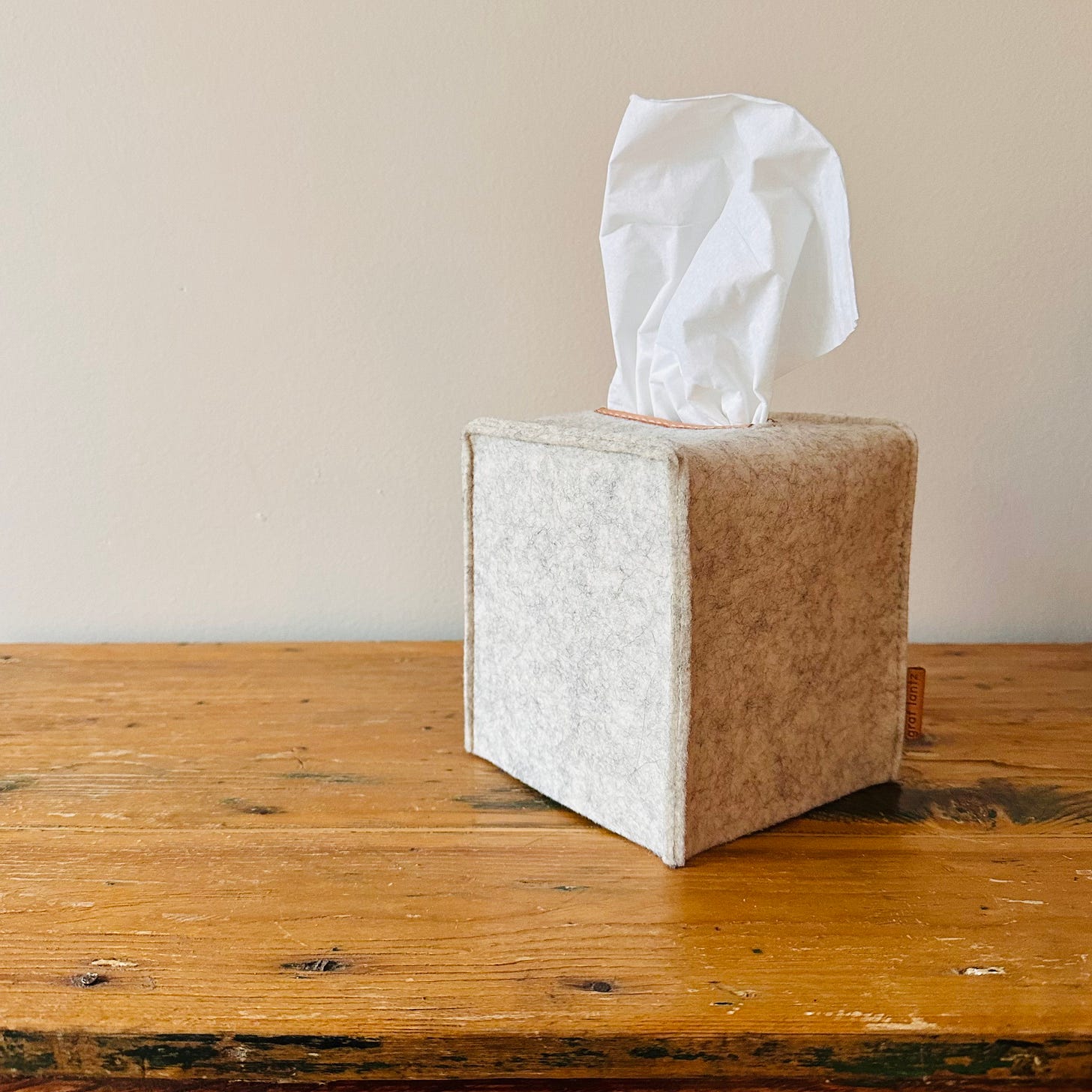When I was growing up, I was told stories about my grandmother. At a time when not all young women were taught to pursue their education, she was encouraged and excelled in her studies, skipping three grades and graduating from high school when she was only sixteen.1 My grandmother was always accomplished, yet she also suffered from incredible anxiety. She refused to turn in her homework unless each word on the page was perfect. If she made a single error, even in the final sentence, rather than crossing out the egregious line, she would return to the beginning and rewrite the entire composition by hand again.
From a rational perspective, a misplaced syllable shouldn’t instill such unease. But as her granddaughter and as someone who can easily be overwhelmed, her behavior makes perfect sense to me.
Throughout my life, I’ve felt most at home within contained spaces—a blank sheet of paper, a yoga mat, an island. I’ve told myself that it’s because, in between the delineated edges, I have more freedom to explore my creativity. To get to know myself. And while that may absolutely be true, I know I also fall prey to perfectionism. Small spaces allow me to believe perfect is possible.
To some extent, it has always been this way. As a child, I was drawn to dioramas, constructing miniature worlds within worlds. Imposing order within my dollhouse most likely became the gateway to color-coding my bookshelves. Like my grandmother, I can become obsessed with the appearance of anything. The scenario doesn’t even need to be real. For example:
Years before John and I even discussed moving in together, I would find myself staring at the bar of Irish Spring in his bathroom, noticing how the green stripes clashed with the shower curtain and imagining the future conversation we might someday have about the advantages of white soap. Now, that’s a lot of perfection projection.
I’ve been accused of curating my life, and I’m sure it’s something I need to look at more closely, or at least at my motives for doing so. I want to believe this surface clean offers me a sense of calm, but does it really? In truth, much of my perfectionism is a cover. It’s a way of trying to control or “fix” something because it doesn’t suit me. Something that really has nothing to do with me at all.
I’m sure I’m a lot to live with—constantly putting away the remotes while the TV is still on or insisting on aesthetically pleasing extension cords. My obsession with surface-perfect enticed me to cover my tissue boxes because if you don’t, they’re all function, no form. But it doesn’t stop there because I also want the tissues angled just this way, which is nearly impossible to maintain if you’re actually using said tissues! I could go on, but I think you get the idea.
My perfectionism makes others uncomfortable; I know as much. It’s never my intent to do so because I know the damage it can inflict. Because it’s happened to me with my grandmother and her desire for things to be a certain way. Even her granddaughter.
As a child, I remember having my thank you notes returned, my grammatical errors circled in red. Or the time I visited her in California, and en route from the airport, she insisted on a “quick stop” to her hair stylist to trim my hair before we got to her home. I didn’t want to get my haircut but didn’t know how to say otherwise. Fortunately, Paolo assured her I looked “just fine.”
I’ve realized it’s more than simply the control I impose upon others because I can do as much (if not more) harm with the control I inflict upon myself. When I was drinking, my perfectionism manifested into wanting the kitchen to be spotless before going to sleep and attempting to unload the dishwasher when the plates were too hot to hold. Even when they burned my fingers and shattered to the floor, I couldn’t stop. My husband would shake his head and walk away, leaving me to clean up the broken pieces by myself.
Perfectionism is a lonely way to live.
The irony is when I go to visit others, I am completely in awe and envious of anyone who can leave things scattered about in their homes, traces of the many ways they are alive. I wish I could be more that way too.
Believe me, I know I’m not perfect, far from it. Because behind every pristine surface, every artfully arranged bowl of sea glass in my house, there is a cupboard that is out of control, one in which I’ve shoved everything away—piles of paper, loose photographs that never made it into albums. And don’t get me started on the digital clutter on my laptop. Or the 1,214 untagged notes in my Notes app; yes, I have discussed this with a therapist.
Perfection insists I can’t begin a project until everything is put away, which becomes the excuse for not doing what I purportedly wanted to do. Imagine how much more true work of value I could create were I not constantly cleaning.
So, am I a minimalist or a control freak? As I write this cringe-worthy confession, I see my own insanity in the ways my desire to appear perfect hides my fear of failure.
Perfectionism can lead me to not being seen at all.
I do have a few ideas about how to change my ways. My colleague, Jennifer Kreatsoulas, shared an exercise about the power of letting go, or at least learning to hold it lightly. I’m looking forward to giving it a try, and I’ve also signed up for this free course, Embrace Imperfection: A 5-Day Pathway. Perhaps it’s of interest to you too?
I loved
's recent newsletter about Eminem’s visual imagination, although I’m sure my grandmother would be appalled. Within Eminem’s scribbles, you can SEE the magic and the wayswith each project, you eventually have to surrender the perfect vision of the work to make room for what you actually create. You are constantly, in that sense, displacing the sleek silhouette of perfection with its imperfect bumbling cousin.2
Tidy has never been my teacher because I know it’s been within the fragments and the messiest moments of my life that I’ve been graced with the opportunity to listen closely. To discover who I truly am and then become that person all the more.
The point of this ramble is to say that I’m going to try to let go and be a little kinder to myself and those I live with, but the jury is still out. I want to believe I could undress the tissue box and not have a panic attack, but…
Still, there’s hope. The other day, I bought three bars of Irish Spring.
I’d love to know how perfectionism speaks to you? What are the ways it appears in your life…hopefully it’s not just me 🙃
if you enjoy this newsletter, i’d love to know! you can leave a comment (or reply to me privately) or restack/share it with a friend. you can also subscribe as a free or paid member ~ or manage an existing subscription. as always, i’m grateful for your readership.
UPCOMING WAYS TO WORK TOGETHER
Close to Home: Blurring the Boundaries of Gender | New Narrative Medicine Workshop Series
Beginning February 20, my colleague Cathy DeFoor, MD and I are offering a narrative medicine workshop series for all caregivers of transgender children and teens.
Join us for some shared time of creative exploration and reflection around common themes in parenting transgender children and teens. Each 90-minute workshop will begin with a guided discussion, followed by a period of personal reflection/journal writing, ending with time for (voluntary) sharing. These sessions are structured to be supportive and inclusive. Our intention is to hold a creative space for processing our own experiences and learn from the stories of others. This is NOT group therapy, although many find the process to be therapeutic.
When: Tuesday, February 20, March 5 + 19 7 - 8:30 pm ET
Session I: What’s in a Name?
Session II: Remembering in the Now
Session III: Paradoxical Parenting
Cost: tiered pricing to accommodate all budgets + scholarships available | a portion of the proceedings will be donated to Lambda Legal
Workshops limited to 15 participants
REGISTER HERE or email me with your questions
My grandmother, Carolyn Bartel Lyon, would go on to graduate from Wellesley, complete her Masters in History from Chicago, and review manuscripts for UChicago Press before marrying my grandfather, the sixth President of Pomona College.
Noah Kahan






Dollhouses as a gateway drug--what a revelation!
And yes, as always, I can relate.
Beautiful essay.
My perfectionism shows up in how I’m perceived by others. I put on the good face, kind, patient, easy going, happy. What I think people want to see. I have found I can tolerate being perfect for about an hour, then my ability to hold the facade starts to crumble and my true self shows up. She’s sometimes impatient, rude, or some other perceived bad quality. I’m learning to do up just as I am more regularly, authentically happy, annoyed, afraid, etc.